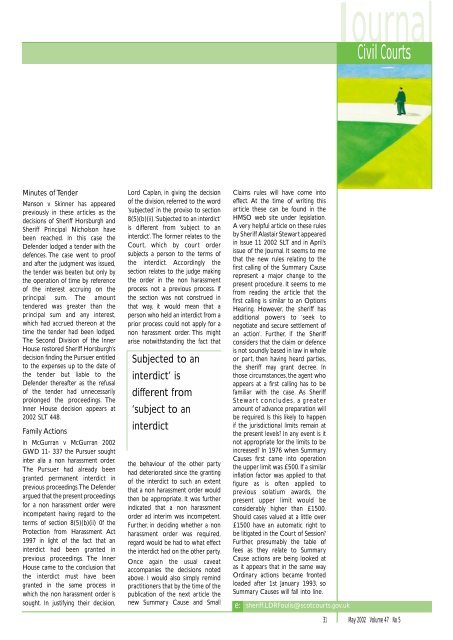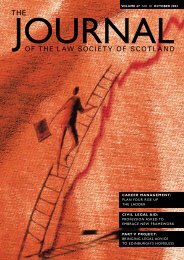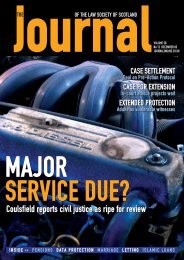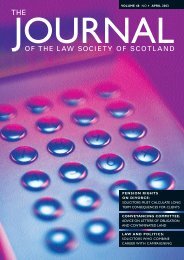OF THE LAW SOCIETY OF SCOTLAND - The Journal Online
OF THE LAW SOCIETY OF SCOTLAND - The Journal Online
OF THE LAW SOCIETY OF SCOTLAND - The Journal Online
Create successful ePaper yourself
Turn your PDF publications into a flip-book with our unique Google optimized e-Paper software.
Minutes of Tender<br />
Manson v Skinner has appeared<br />
previously in these articles as the<br />
decisions of Sheriff Horsburgh and<br />
Sheriff Principal Nicholson have<br />
been reached. In this case the<br />
Defender lodged a tender with the<br />
defences. <strong>The</strong> case went to proof<br />
and after the judgment was issued,<br />
the tender was beaten but only by<br />
the operation of time by reference<br />
of the interest accruing on the<br />
principal sum. <strong>The</strong> amount<br />
tendered was greater than the<br />
principal sum and any interest,<br />
which had accrued thereon at the<br />
time the tender had been lodged.<br />
<strong>The</strong> Second Division of the Inner<br />
House restored Sheriff Horsburgh’s<br />
decision finding the Pursuer entitled<br />
to the expenses up to the date of<br />
the tender but liable to the<br />
Defender thereafter as the refusal<br />
of the tender had unnecessarily<br />
prolonged the proceedings. <strong>The</strong><br />
Inner House decision appears at<br />
2002 SLT 448.<br />
Family Actions<br />
In McGurran v McGurran 2002<br />
GWD 11- 337 the Pursuer sought<br />
inter alia a non harassment order.<br />
<strong>The</strong> Pursuer had already been<br />
granted permanent interdict in<br />
previous proceedings.<strong>The</strong> Defender<br />
argued that the present proceedings<br />
for a non harassment order were<br />
incompetent having regard to the<br />
terms of section 8(5)(b)(ii) 0f the<br />
Protection from Harassment Act<br />
1997 in light of the fact that an<br />
interdict had been granted in<br />
previous proceedings. <strong>The</strong> Inner<br />
House came to the conclusion that<br />
the interdict must have been<br />
granted in the same process in<br />
which the non harassment order is<br />
sought. In justifying their decision,<br />
Lord Caplan, in giving the decision<br />
of the division, referred to the word<br />
‘subjected’ in the proviso to section<br />
8(5)(b)(ii).‘Subjected to an interdict’<br />
is different from ‘subject to an<br />
interdict’. <strong>The</strong> former relates to the<br />
Court, which by court order<br />
subjects a person to the terms of<br />
the interdict. Accordingly the<br />
section relates to the judge making<br />
the order in the non harassment<br />
process not a previous process. If<br />
the section was not construed in<br />
that way, it would mean that a<br />
person who held an interdict from a<br />
prior process could not apply for a<br />
non harassment order. This might<br />
arise notwithstanding the fact that<br />
Subjected to an<br />
interdict’ is<br />
different from<br />
‘subject to an<br />
interdict<br />
the behaviour of the other party<br />
had deteriorated since the granting<br />
of the interdict to such an extent<br />
that a non harassment order would<br />
then be appropriate. It was further<br />
indicated that a non harassment<br />
order ad interim was incompetent.<br />
Further, in deciding whether a non<br />
harassment order was required,<br />
regard would be had to what effect<br />
the interdict had on the other party.<br />
Once again the usual caveat<br />
accompanies the decisions noted<br />
above. I would also simply remind<br />
practitioners that by the time of the<br />
publication of the next article the<br />
new Summary Cause and Small<br />
Claims rules will have come into<br />
effect. At the time of writing this<br />
article these can be found in the<br />
HMSO web site under legislation.<br />
A very helpful article on these rules<br />
by Sheriff Alastair Stewart appeared<br />
in Issue 11 2002 SLT and in April’s<br />
issue of the <strong>Journal</strong>. It seems to me<br />
that the new rules relating to the<br />
first calling of the Summary Cause<br />
represent a major change to the<br />
present procedure. It seems to me<br />
from reading the article that the<br />
first calling is similar to an Options<br />
Hearing. However, the sheriff has<br />
additional powers to ‘seek to<br />
negotiate and secure settlement of<br />
an action’. Further, if the Sheriff<br />
considers that the claim or defence<br />
is not soundly based in law in whole<br />
or part, then having heard parties,<br />
the sheriff may grant decree. In<br />
those circumstances, the agent who<br />
appears at a first calling has to be<br />
familiar with the case. As Sheriff<br />
Stewart concludes, a greater<br />
amount of advance preparation will<br />
be required. Is this likely to happen<br />
if the jurisdictional limits remain at<br />
the present levels? In any event is it<br />
not appropriate for the limits to be<br />
increased? In 1976 when Summary<br />
Causes first came into operation<br />
the upper limit was £500. If a similar<br />
inflation factor was applied to that<br />
figure as is often applied to<br />
previous solatium awards, the<br />
present upper limit would be<br />
considerably higher than £1500.<br />
Should cases valued at a little over<br />
£1500 have an automatic right to<br />
be litigated in the Court of Session?<br />
Further, presumably the table of<br />
fees as they relate to Summary<br />
Cause actions are being looked at<br />
as it appears that in the same way<br />
Ordinary actions became fronted<br />
loaded after 1st January 1993, so<br />
Summary Causes will fall into line.<br />
e:<br />
sheriff.LDRFoulis@scotcourts.gov.uk<br />
<strong>Journal</strong><br />
Civil Courts<br />
31 May 2002 Volume 47 No 5










